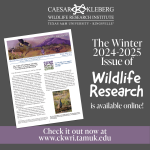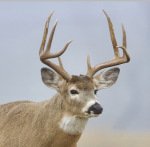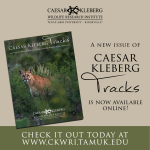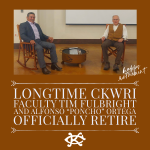
All News
CKWRI's Dr. Sandra Rideout-Hanzak was recently featured on Land.com Podcast to discuss harnessing the power of fire to benefit rangelands, forests and wildlife. Check out the episode now on Spotify by clicking the link below.
https://open.spotify.com/episode/4qhpFm2gfTbP5RSEYpvxry?si=ZWZbyznbQTuH…
Join us on Wednesday, May 7, 2025 from 11:00 AM to 1:00 PM at the Caesar Kleberg Wildlife Center, 1730 West Corral Ave, Kingsville, Texas for a luncheon and presentation to learn about the South Texas Property Rights Association, the Wildlife Photography Program at TAMUK, incorporating photography into your ranch activities for fun or income, and how to support the photography program. Registration cost is $40 per person. Register Here
Learn about the Value of Pricklypear and other Native Plants as Nesting Habitat for Chestnut-bellied Scaled Quail in the latest issue of Wildlife Research newsletter!
Make plans to join us on March 7, 2024 in San Antonio, Texas for the latest updates on deer research! Can't make it in person? Join us online!
The Caesar Kleberg Wildlife Research Institute has the opportunity to award annual scholarships to Institute graduate students and Range and Wildlife Management undergraduate students who have demonstrated outstanding academic and professional excellence in their progress towards attaining either an advanced degree (M.S. or Ph.D.) in range and wildlife management or a bachelor’s degree in range and wildlife management.*Applicants will be considered for all scholarships. No need to apply for a specific scholarship.
A new issue of Caesar Kleberg Tracks is now available online! Read about the aging techniques for identifying the age of deer, how mountain lions are navigating life in the transboundary region, hurdles of a wildlife biologist studying the spot-tailed earless lizard, and more in the Fall 2024 Issue of Caesar Kleberg Tracks magazine.
Longtime CKWRI faculty Tim Fulbright and Alfonso “Poncho” Ortega have officially retired. Earlier this month the Institute hosted a retirement celebration in their honor. It was fitting that they were recognized together because they worked closely on many projects and published 4 books on white-tailed deer management together.
PLEASANTON — In Texas mountain lions are classified as a non-game species. That means there is no defined hunting season. However, in June, the Texas Parks and Wildlife Commission unanimously passed a proposal to prohibit canned hunting of mountain lions. The regulations, designed to support ethical hunting and trapping practices while providing flexibility for landowners to manage mountain lions, also included a 36-hour trap check. Despite these measures, there is growing concern about how mountain lions are being impacted by border security activities.
Read about the Thorny Path to Restoration, Tracking Northern Pintails through Adverse Weather, Supplemental Feed Programs for White-tailed Deer, and more in the this issue of Caesar Kleberg Tracks magazine.









